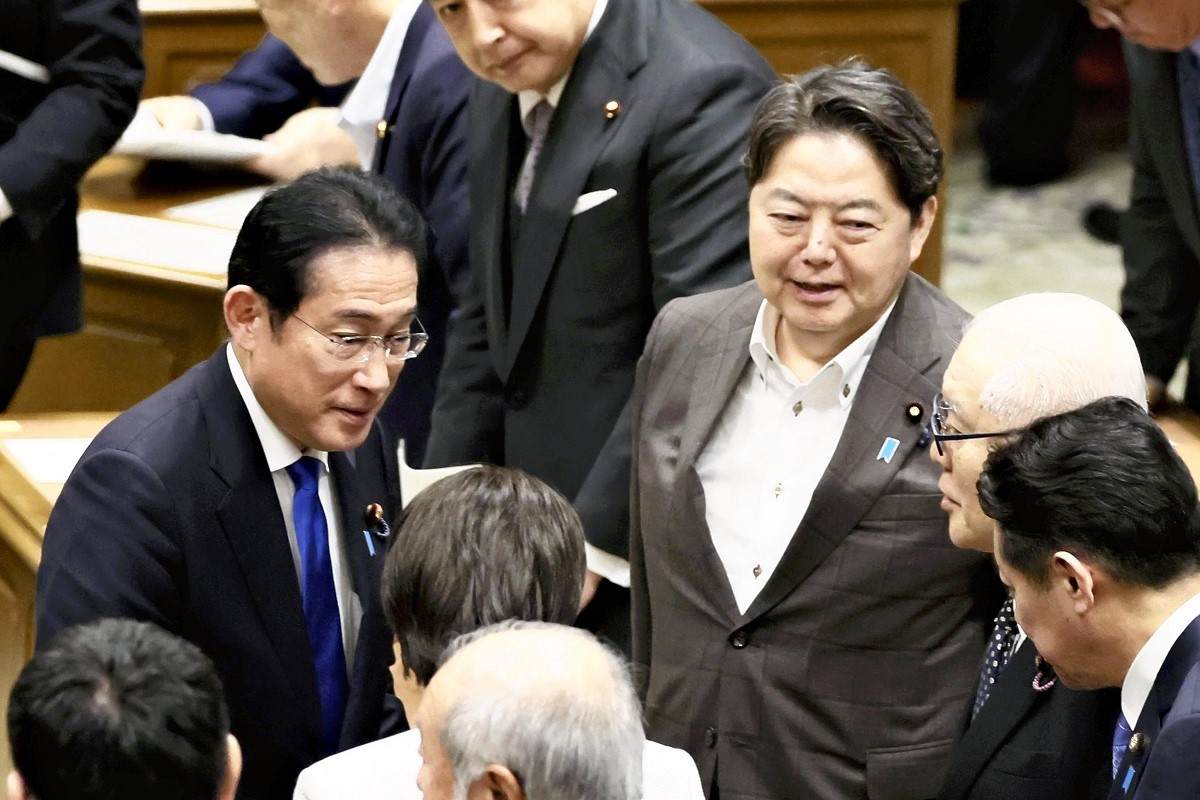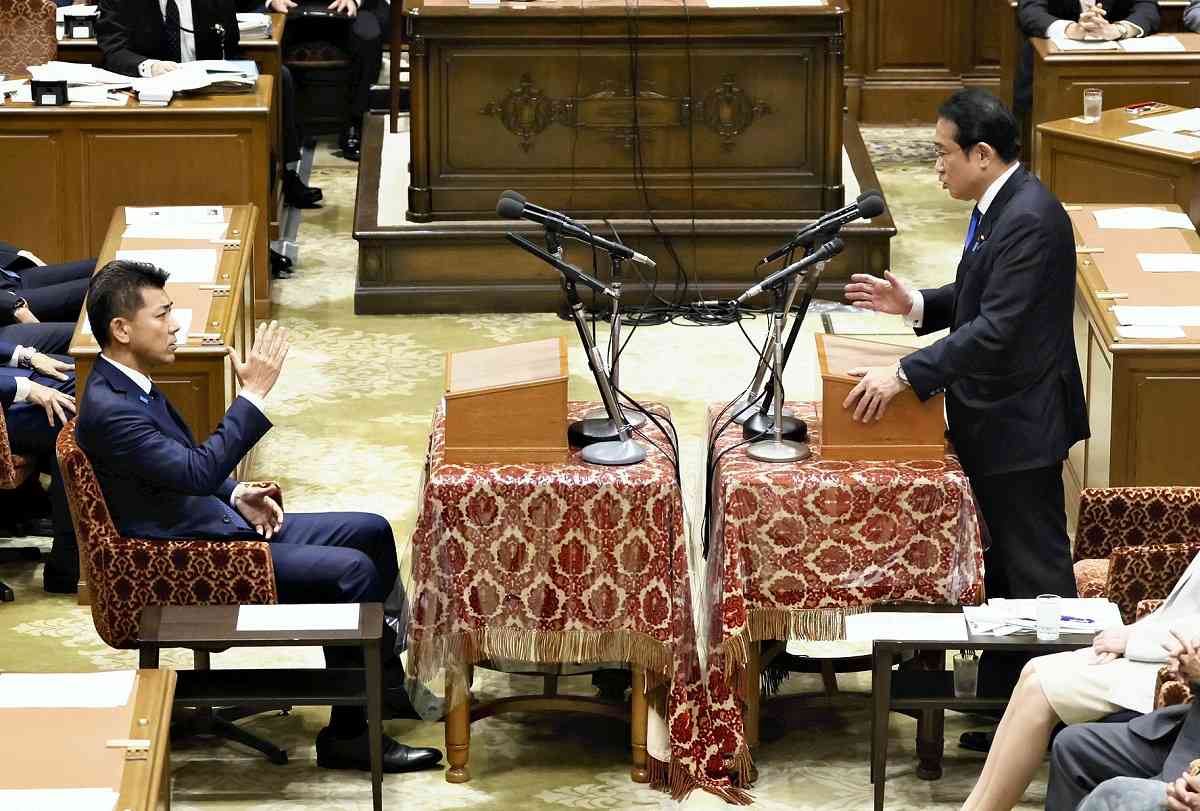Kishida Rules Out Lower House Dissolution, General Election; Shrugs Off Mounting Criticism From Allies And Opponents

Prime Minister Fumio Kishida, left, talks with members of his Cabinet after the party leaders’ debate in the Diet on Wednesday.
16:43 JST, June 20, 2024
Prime Minister Fumio Kishida effectively ruled out dissolving the House of Representatives for a general election Wednesday, a move prompted by the strong political winds buffeting his administration.
Kishida’s repeated concessions during discussions over amendments to the Political Funds Control Law have weakened the foundations of his administration, as public opinion has been highly critical of the revisions he accepted, which were proposed following a spate of slush fund scandals within the ruling Liberal Democratic Party.
A revised version of the law was enacted by the Diet earlier that day. During a debate between political party leaders in the Diet, Constitutional Democratic Party of Japan leader Kenta Izumi pressed Kishida, who is the president of the LDP, to “seek a mandate from the people” over whether the amended law was “good or bad.” Kishida rebuffed this demand, saying, “I will focus on addressing various issues, starting with the economy, and on producing results. I’m not thinking about anything else.”

Prime Minister Fumio Kishida, right, answers a question asked by Constitutional Democratic Party of Japan leader Kenta Izumi during their debate in the Diet on Wednesday.
Kishida also lobbed a few barbs of his own at Izumi and the CDPJ, who suggested banning corporate donations, political fundraising parties and political activity expenses.
“Banning this, that and the other thing might feel very good,” Kishida said. “But political funds are an extremely important element that supports democracy.” Kishida also twisted the knife further by adding, “Your party talks about banning these things, but you hold fundraising parties and receive donations from labor unions.”
During discussions between ruling and opposition parties over possible revisions to the law, Kishida had frequently caved to pressure from parties including the LDP’s ruling coalition partner, Komeito, and the opposition Japan Innovation Party. “We were always a step behind, and we couldn’t even protect the things we should’ve protected,” a veteran member of the LDP faction headed by the party’s Vice President Taro Aso grumbled. The opposition also criticized the revised law, with one party member saying, “It’s full of loopholes and totally inadequate.”
The debate also gave Kishida an opportunity to ask questions of his own to the opposition leaders. The prime minister used this stage to try and emphasize that the latest law revisions were “the most realistic” option.
Izumi bluntly gave the revised law a “failing grade” and demanded Kishida dissolve the lower house. The public also has been unimpressed by the LDP’s revisions to the law. A Yomiuri Shimbun national survey conducted in May found that almost 80% of respondents had an unfavorable opinion of the amendments.
“The prime minister going on the attack during the leaders’ debate was a sign of his desperation, but I doubt it will resonate much with the public,” a senior LDP official admitted.
‘Assailed from all sides’
The Japan Innovation Party supported the LDP’s law changes in the House of Representatives but then voted against them in the House of Councillors due to disagreements over the research, study, public relations and accommodation monthly allowance for lawmakers.
The JIP leader Nobuyuki Baba proposed that Kishida should extend the Diet session if he “really wanted to do this.” However, Kishida would only say that although he had not specified a time limit, his hope that it would be done as quickly as possible was “completely sincere.”
Kishida’s term as LDP president expires at the end of September. However, difficulties in coordinating the revisions to the law have created rifts within the party’s leadership, and there seems little prospect of Kishida’s administration rising in the polls. Several party leaders ridiculed Kishida’s predicament during the debate.
“Many LDP lawmakers are complaining about the prime minister. The Kishida Cabinet has exhausted all its options,” Baba said. “I urge the entire Cabinet to resign and pass the baton to a prime minister who will be able to take responsibility and get the job done.”
When opposition Democratic Party For the People leader Yuichiro Tamaki described Kishida as “being assailed from all sides,” the prime minister gave a response that seemed to be as much for his own ears as anyone else’s.
“I don’t feel that I’m being assailed from every direction,” Kishida insisted. “It’s a politician’s responsibility to do what should be done, even when he’s being criticized.”
Top Articles in Politics
-

Japan PM Takaichi’s Cabinet Resigns en Masse
-

Sanae Takaichi Elected Prime Minister of Japan; Keeps All Cabinet Appointees from Previous Term
-

Japan’s Govt to Submit Road Map for Growth Strategy in March, PM Takaichi to Announce in Upcoming Policy Speech
-

LDP Wins Historic Landslide Victory
-

LDP Wins Landslide Victory, Secures Single-party Majority; Ruling Coalition with JIP Poised to Secure Over 300 seats (UPDATE 1)
JN ACCESS RANKING
-

Producer Behind Pop Group XG Arrested for Cocaine Possession
-

Japan PM Takaichi’s Cabinet Resigns en Masse
-

Man Infected with Measles Reportedly Dined at Restaurant in Tokyo Station
-

Israeli Ambassador to Japan Speaks about Japan’s Role in the Reconstruction of Gaza
-

Videos Plagiarized, Reposted with False Subtitles Claiming ‘Ryukyu Belongs to China’; Anti-China False Information Also Posted in Japan
























